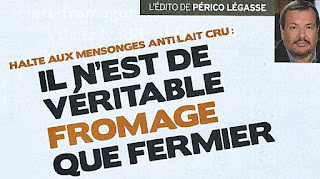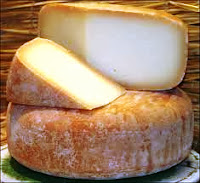But it was the editorial that rang true for me, so I did a loose translation of it for you all.
Stop the Anti-raw milk lies ! There is no real cheese other than farmhouse
Until the installation of the technologies permitting them to be produced mechanically, at the beginning of the 20th century, there was no cheese other than farmhouse cheese, made on a farm, with milk taken from cows, goats or sheep from the farm, fed in the fields of the farm. The herds progressed from the valley pastures, wooded countryside or plateaux, climbing to the beautiful grasses in mountain or summer pastures for the spring and summer seasons and, once winter came, resting in the barn eating the hay from the prairie. This peasant agriculture worked without sanitary constraints, the raw milk which had at its disposal natural antibodies to eliminate intruding bacteria, was contrary to pasteurised milk, which is extremely fragile if it is re-exposed to pathogenic bacteria. And if there was an accident, since zero risk is inexistent, it provoked infinitely less damage than the toxins of contemporary junk food.
Biodiversity was at its height reflecting the nuances of “terroir”. For example, in the little canton of Bricquebec, north of Cotentin in the department of Manche, there were no less than 20 producers of camembert in 2010. Originally from Cherbourg, my grandmother, born in 1899, remembered that one served 14 different camembert at the Sunday table in Quenillé, all of which being tasted, grandfather Vauvert could name each producer: such and such came from the farm La Chavinière, at Sottevast, and this one from the farm Pierrepont, at Quettehou. Normandy claimed a good two thousand farm atelier in the five departments and more than a hundred mechanical fabricators. Now only two farmhouse producers and eight of the last industrial producers using raw milk exist in 2016.
Here we must reveal a reality: the fact that as a result of the global sterilization in the prevailing environment and the level of normalized hygiene imposed at agricultural cooperatives in the last decade, raw milk is no longer as raw as it was in the past. The indigent microbial flora present in today’s natural environment is considerably inferior to what it was. The environment has change and nature with it. We now need to re-inseminate the milk to reinforce its capacity to ferment, all while running the risk of pathogenic contamination. This confirms that the most authentic cheese representing “terroir” are not what they were yesterday. A terrible confession!
This does take anything away from the quality of our farmhouse production, of which here at Marianne, we defend its permanence. The preservation of our cheese traditions become in effect a major issue faced with the more and more drastic norms that the professionals of raw milk unfairly have to put up with and the eagerness shown by some governments to catch them out, reminiscent of some ideological bias. Food security is not negotiable, except while it serves as a pretext to eradicate the competition to consolidate those parts of the market for the industrial lobby. Farmhouse cheeses are not the only ones to be squeezed; the small and medium sized milk producers attached to raw milk are also victims of this zeal, this harassment, by certain agencies of the state. The examples multiply.
Listeria is often a good excuse to obtain the closing of a production unit or destruction of a contaminated lot of cheese, while a new offensive is prepared by Brussels to try and establish the dangerousness of raw milk at a European scale. In 2015, a million tons of cheese was sacrificed under this sacrosanct hygieno-political dogma. Under the force of such pressures (and disguised repression), entire groups will finish by ending their production and the camp of “all things pasteurised” will win. All this rendering food banal in an aseptic and submissive world.
It is evident that, beyond the debate about durable agriculture, biodiversity disturbs the free-market system and that the financial equation of the industry-publicity-big distribution triad badly serves living products. Why? Simply because raw milk is more complex to treat on a large scale and that its passage through the industrial process requires onerous levels of control. Full of its active natural flora, cheese made with raw milk evolves more rapidly than pasteurised milk cheeses where the capacity to conserve them is much longer; therefore, more cost effective. Thermalization at 63°C or pasteurization at 72°C of milk limits constraints and augments the profit margins, the ideal for satisfying financial gains of consumerism. Especially for the shelves of the big distribution groups.
In 2007, the Groupe Lactalis and the Cooperative Isigny Sainte-Mère insisted that the rules for Camembert de Normandie abandon its AOC obligation to use raw milk so they could benefit from AOC labelling. The demand was rejected. However, for these merchants of plaster with their glorified labels, created from publicity campaign, the proponents of organoleptic and sensory authenticity from fermented pastes, i.e., farmhouse cheeses were supported by INAO for the moment, ensuring that we have our cake and can eat it too.…But will they always have the legal means to support this combat of David against Goliath? Their determination, and the vigilance of the aware consumer, holds the key to safeguarding the heritage of French cheese with respect to its origins. Hands off my cheese…farmhouse cheese that is!






